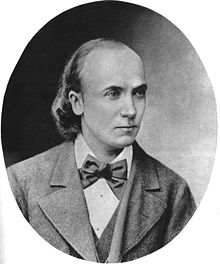Jacob Hurt
Jakob Hurt (born July 10, jul. / 22. July 1839 greg. In the village Himmaste , then community Vana-Koiola , parish Põlva , Livonia , † December 31, 1906 jul. / 13. January 1907 greg. In Saint Petersburg , Russia ) was an Estonian folklorist , theologian and linguist .
Early years
Jakob Hurt was born to Jaan Hurt (1818–1861) and his wife Marie (née Kurvitsa, 1818–1898). He went to the Himmaste Village School (now Põlva Parish ) and the Põlva Parish School. From 1853 to 1855 he attended the district school and grammar school in Tartu .
Hurt studied from 1859 to 1864 theology at the University of Tartu , where he in since 1860 Corporation Livonia was active. He graduated in 1865 as cand. Theol. from. After that, Jakob Hurt was employed as a private tutor for the Alexander Theodor von Middendorff family in Hellenurme (today Palupera municipality ) in 1865/66 . From 1868 to 1872 he worked as a high school teacher in Tartu and Kuressaare .
Pastor
In November 1872 Jakob Hurt was ordained in St. Mary's Church in Tartu . From 1872 to 1880 he was pastor in Otepää and then headed the Estonian parish in Saint Petersburg from 1880 to 1901 as pastor .
Jakob Hurt married Eugenie Oettel in July 1868. The couple had six children.
Estonian language
As a young student, Jakob Hurt was committed to strengthening the Estonian language and culture during the National Awakening . From 1872 to 1881 he was the first president of the influential Estonian literary association ( Eesti Kirjameeste Selts ), which advocated the propagation and modernization of the Estonian language . In 1886 he received his doctorate in philosophy with a linguistic thesis at the University of Helsinki .
Jakob Hurt took a moderate line in advocating a stronger Estonian identity and distinguished himself from Baltic German and German-influenced pastors as well as from the more radical thoughts of the Estonian publicist Carl Robert Jakobson . The use of Estonian in schools and in popular education was a particular concern for Hurt.
In the 1880s he withdrew more and more from public life, but remained one of the leading figures of the national Estonian emancipation movements. From then on, Jakob Hurt mainly devoted himself to folklore and linguistics . His work on Estonian is one of the formative works for the formation of the written language. In Lühikene õpetus kirjutamisest parandatud viisi (1864), Hurt laid the foundation for a modernized orthography . His doctoral thesis The Estonian nouns on -ne purum (1886) and the monograph Eesti sõnadest -line lõpuga (1903) were pioneering works on Estonian. In collaboration with the linguist Ferdinand Johann Wiedemann , Hurt was involved in the work on the large Estonian-German dictionary.
Folklore
In addition, Jakob Hurt systematically collected Estonian folk poetry and folk songs , which he published from 1863. Under the heading Monumenta Estoniae Antiquae , articles on the knowledge of Estonian sagas and traditions (1863), Vana Kannel (Volume 1: 1875–1886, Volume 2: 1884–1886) and Setukeste laulud (1904–1907) appeared.
Jakob Hurt is buried today in the Raadi cemetery in Tartu. His portrait could be seen on the ten-kroner bill, which was valid until 2011 .
He is a member of the Student Estonian Association .
Most important works
- Contributions to the knowledge of Estonian sagas and traditions , Tartu 1863
- Lühikene õpetus õigest kirjutamisest parandatud viisi , Tartu 1864
- Vana Kannel I , Tartu 1875–1886
- Pildid isamaa sinud asjust , Tartu 1879
- Vana Kannel II , Tartu 1884–1886
- The Estonian nouns on -ne purum , Helsinki 1886
- Eesti astronoomia , Tartu 1899
- About the Pleskau Estonians or the so-called Setukese , Helsinki 1904
- Setukeste laulud I-III , Helsinki 1904–1907
literature
- Rudolf Põldmäe: Noor Jakob Hurt . Tallinn 1988
- Mart Laar , Rein Saukas, Ülo Tedre (Ed.): Jakob Hurt 1839-1907 . Tallinn 1989
- Mart Laar: Raamat Jakob Hurdast . Tartu 1995
- Tiiu Jaago: Jakob Hurt: "The Birth of Estonian-language Folklore Research." In: Kristin Kuutma, Tiiu Jaago (Ed.): Studies in Estonian Folkloristics and Ethnology. A Reader and Reflexive History. Tartu: Tartu University Press 1995 ( ISBN 9949-11-110-2 ), pp. 45-64
Web links
- Literature by and about Jakob Hurt in the catalog of the German National Library
- Detailed biography (Estonian)
- Setukeste laulud I-III
- Album academicum of the Imperial University of Dorpat , Dorpat 1889
| personal data | |
|---|---|
| SURNAME | Hurt, Jacob |
| BRIEF DESCRIPTION | Estonian linguist, theologian and folklorist |
| DATE OF BIRTH | July 22, 1839 |
| PLACE OF BIRTH | Himmaste village, Vana-Koiola parish, Põlva parish, now Estonia |
| DATE OF DEATH | January 13, 1907 |
| Place of death | St. Petersburg |


